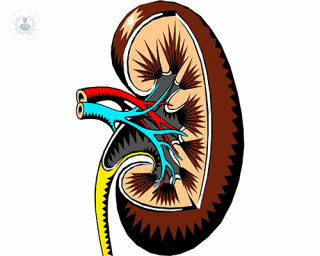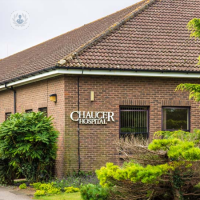Acute kidney injury (AKI)
What is it?
The kidneys are located under the ribcage, on either side of the spine. They are the urinary tract organs that get injured most often.
The kidneys are protected by the spine, the back muscles, and the lower ribcage, as well as a cushion of fat.
A kidney injury may affect part of the kidney and severity may vary. There can be many causes for a kidney injury - some are listed below.

Prognosis
Prognosis will depend on the cause and the seriousness of the injury. The injury may be mild and reversible, but it some cases it could be lethal. They can also go on to cause long-term problems, which could end up causing a variety of complications.
There are some cases where the kidney starts to function properly again, and others where there is kidney failure.
If injuries are detected early, patients tend to make a full recovery.
What are the symptoms?
Kidney injury symptoms may include pain or bruising above the abdomen or between the hip and ribs. Other common symptoms include:
- Blood in the urine or an inability to urinate
- Abdominal, back, or side swelling or pain
- Drowsiness
- Increased heart rate
- Vomiting or nausea
- Pale or cold skin
- Sweating
It should be noted that if one kidney is injured and the other is healthy, symptoms may not be present.
Medical tests
The specialist will look at the patient's medical history and check if they have had a recent illness, taken medications, or been in contact with a toxic substance. If it is a physical injury, the patient should know what caused it. After the examination, the following tests may be carried out:
- Abdominal CT scan
- Abdominal MRI scan
- Abdominal ultrasound
- Electrolytes in the blood
- Blood test
- Kidney X-ray
- Renal artery or vein angiography
- Renal scintigraphy
- Urine analysis
A physical exam can detect bleeding, kidney sensitivity, shock, or signs of kidney failure.
What causes it?
There can be many causes for a kidney injury. The kidneys may be injured due to blood vessel damage that irrigates or drains the kidneys. Examples include:
- Aneurysm
- Arterial blockage
- Renal vein thrombosis
- Injury
Other reasons for a kidney injury include:
- Autoimmune disorders
- Diabetes or high blood pressure
- Kidney, pelvic, or colon cancer
- Inflammation due to medications or infections
- Kidney stones
- Bladder outlet obstruction
- Angiomyolipoma (benign tumour)
- Toxic substance exposure
- Body waste accumulation, such as uric acid
How can it be prevented?
The following may help prevent a kidney injury:
- Take care with intoxicating substances
- Follow specialist advice for medication use and other conditions
- Wear adequate protective equipment when at work and when exercising
What is the treatment?
Treatment will depend on the severity of the injury. In minor cases, it can be treated by consuming plenty of fluids and resting. This helps the kidney heal itself.
To treat the most urgent symptoms or potential complications, the patient may need to be admitted to hospital. Some treatments that may be recommended for kidney injuries include:
- Bed rest for one or two weeks
- Monitoring and treating kidney failure symptoms
- Painkillers
- Changing your diet
- Medications, if the injury is because of toxic substances, or to treat inflammation










